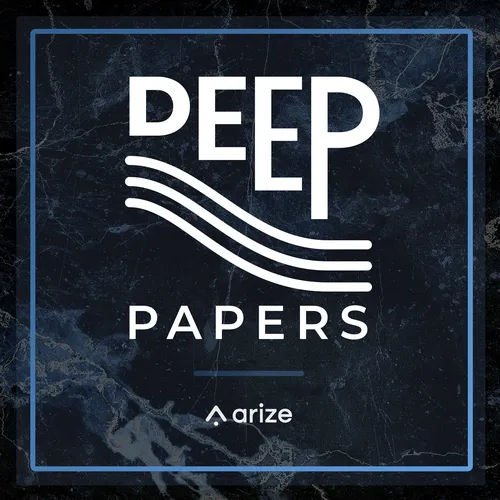
Deep Papers
Deep Papers is a podcast series featuring deep dives on today’s most important AI papers and research. Hosted by Arize AI founders and engineers, each episode profiles the people and techniques behind cutting-edge breakthroughs in machine learning.
- Update frequency
- every 15 days
- Average duration
- 36 minutes
- Episodes
- 55
- Years Active
- 2023 - 2025

KV Cache Explained
In this episode, we dive into the intriguing mechanics behind why chat experiences with models like GPT often start slow but then rapidly pick up speed. The key? The KV cache. This essential but unde…

The Shrek Sampler: How Entropy-Based Sampling is Revolutionizing LLMs
In this byte-sized podcast, Harrison Chu, Director of Engineering at Arize, breaks down the Shrek Sampler.
This innovative Entropy-Based Sampling technique--nicknamed the 'Shrek Sampler--is transform…

Google's NotebookLM and the Future of AI-Generated Audio
This week, Aman Khan and Harrison Chu explore NotebookLM’s unique features, including its ability to generate realistic-sounding podcast episodes from text (but this podcast is very real!). They dive…

Exploring OpenAI's o1-preview and o1-mini
OpenAI recently released its o1-preview, which they claim outperforms GPT-4o on a number of benchmarks. These models are designed to think more before answering and handle complex tasks better than t…

Breaking Down Reflection Tuning: Enhancing LLM Performance with Self-Learning
A recent announcement on X boasted a tuned model with pretty outstanding performance, and claimed these results were achieved through Reflection Tuning. However, people were unable to reproduce the r…

Composable Interventions for Language Models
This week, we're excited to be joined by Kyle O'Brien, Applied Scientist at Microsoft, to discuss his most recent paper, Composable Interventions for Language Models. Kyle and his team present a new …

Judging the Judges: Evaluating Alignment and Vulnerabilities in LLMs-as-Judges
This week’s paper presents a comprehensive study of the performance of various LLMs acting as judges. The researchers leverage TriviaQA as a benchmark for assessing objective knowledge reasoning of L…

Breaking Down Meta's Llama 3 Herd of Models
Meta just released Llama 3.1 405B–according to them, it’s “the first openly available model that rivals the top AI models when it comes to state-of-the-art capabilities in general knowledge, steerabi…

DSPy Assertions: Computational Constraints for Self-Refining Language Model Pipelines
Chaining language model (LM) calls as composable modules is fueling a new way of programming, but ensuring LMs adhere to important constraints requires heuristic “prompt engineering.”
The paper this …

RAFT: Adapting Language Model to Domain Specific RAG
Where adapting LLMs to specialized domains is essential (e.g., recent news, enterprise private documents), we discuss a paper that asks how we adapt pre-trained LLMs for RAG in specialized domains. S…

LLM Interpretability and Sparse Autoencoders: Research from OpenAI and Anthropic
It’s been an exciting couple weeks for GenAI! Join us as we discuss the latest research from OpenAI and Anthropic. We’re excited to chat about this significant step forward in understanding how LLMs …

Trustworthy LLMs: A Survey and Guideline for Evaluating Large Language Models' Alignment
We break down the paper--Trustworthy LLMs: A Survey and Guideline for Evaluating Large Language Models' Alignment.
Ensuring alignment (aka: making models behave in accordance with human intentions) ha…

Breaking Down EvalGen: Who Validates the Validators?

Keys To Understanding ReAct: Synergizing Reasoning and Acting in Language Models
This week we explore ReAct, an approach that enhances the reasoning and decision-making capabilities of LLMs by combining step-by-step reasoning with the ability to take actions and gather informatio…

Demystifying Chronos: Learning the Language of Time Series
This week, we’ve covering Amazon’s time series model: Chronos. Developing accurate machine-learning-based forecasting models has traditionally required substantial dataset-specific tuning and model c…

Anthropic Claude 3
This week we dive into the latest buzz in the AI world – the arrival of Claude 3. Claude 3 is the newest family of models in the LLM space, and Opus Claude 3 ( Anthropic's "most intelligent" Claude m…

Reinforcement Learning in the Era of LLMs
We’re exploring Reinforcement Learning in the Era of LLMs this week with Claire Longo, Arize’s Head of Customer Success. Recent advancements in Large Language Models (LLMs) have garnered wide attenti…

Sora: OpenAI’s Text-to-Video Generation Model
This week, we discuss the implications of Text-to-Video Generation and speculate as to the possibilities (and limitations) of this incredible technology with some hot takes. Dat Ngo, ML Solutions Eng…

RAG vs Fine-Tuning
This week, we’re discussing "RAG vs Fine-Tuning: Pipelines, Tradeoff, and a Case Study on Agriculture." This paper explores a pipeline for fine-tuning and RAG, and presents the tradeoffs of both for …

Phi-2 Model
We dive into Phi-2 and some of the major differences and use cases for a small language model (SLM) versus an LLM.
With only 2.7 billion parameters, Phi-2 surpasses the performance of Mistral and Llam…